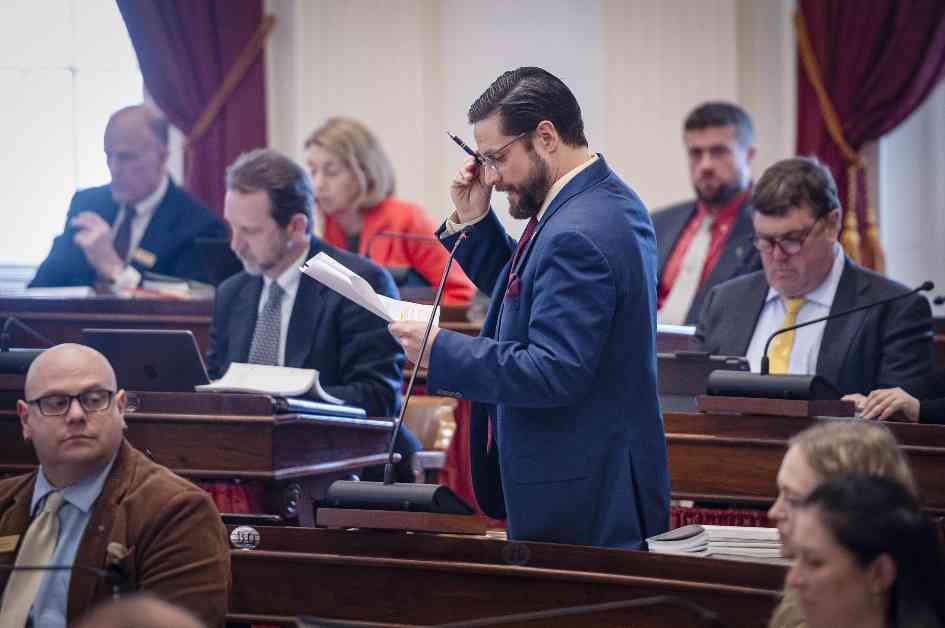In a bustling Statehouse in Montpelier, Rep. Matt Birong, D-Vergennes, stood before his colleagues to shed light on the details of a groundbreaking cannabis bill. The date was March 26, 2024, a pivotal moment that marked the beginning of a new biennium, ushering in changes to the jurisdictions of various House and Senate committees. However, amidst this sea of transformation, a new proposal emerged that could revolutionize the way government oversight functions in Vermont.
Proposed by Rep. Chea Waters Evans, D-Charlotte, H.67 seeks to establish a “Joint Government Oversight and Accountability Committee,” comprising eight members from both chambers. This committee would be responsible for monitoring significant state expenditures and assessing the long-term effectiveness of key laws. The ability of this new committee to convene outside of the regular legislative session sets it apart, allowing for a more thorough examination of government oversight failures and the formulation of actionable recommendations to prevent such missteps.
The impetus behind this proposal stems from a growing concern among House Democrats regarding the need for enhanced oversight across state government. Rep. Birong highlighted the billions of dollars allocated during the federal Covid-19 era emergency funding, emphasizing the importance of ensuring that these funds are utilized in a manner aligned with legislative intent. Should discrepancies arise in the allocation of these resources, the proposed oversight panel could reevaluate appropriations, ensuring accountability and transparency in government spending.
As the House Government Operations and Military Affairs Committee, chaired by Birong, deliberated on this groundbreaking bill, it became evident that the oversight committee’s role would extend far beyond mere financial oversight. Waters Evans emphasized the importance of reviewing the myriad reports filed by the executive branch and other entities, providing lawmakers with crucial insights into the state’s progress in implementing policy changes. By shedding light on areas where legislators may have fallen short in reviewing these reports, the proposed committee aims to enhance the legislative process and promote thorough scrutiny of government operations.
Despite the compelling arguments put forth by Waters Evans and her fellow sponsors of the bill, the proposal faced skepticism from some quarters. Governor Phil Scott expressed reservations about the necessity of establishing a new legislative committee, citing existing oversight mechanisms as adequate. His reluctance to endorse the creation of the oversight committee underscores the need for further dialogue and deliberation on the optimal approach to enhancing government accountability in Vermont.
### In the know: Education Reform and School Choice
In a separate realm of legislative innovation, Governor Phil Scott’s educational proposal has captured the attention of lawmakers and educators alike. Under Scott’s transformative plan, every student would have the opportunity to participate in a school choice lottery system within their regional school district. Education Secretary Zoie Saunders provided critical insights into the mechanics of this proposed system, offering a glimpse into a potentially revolutionary approach to education in Vermont.
The proposed school choice system would assign each student to a public elementary, middle, and high school within their district, with limited exceptions. Additionally, students would have the option to apply for a lottery to attend a designated “school choice school,” which could include magnet public schools or private institutions. While the specifics of this proposal are still being fine-tuned, the potential for increased access and diversity in educational offerings is a tantalizing prospect for many stakeholders.
Rep. Peter Conlon, D-Cornwall, lauded Scott’s proposal as a provocative and much-needed intervention in Vermont’s education landscape. By fostering a more dynamic and inclusive educational environment, this initiative has the potential to reshape the educational trajectory of countless students and invigorate the state’s approach to learning and development.
### Safeguarding Democracy: Addressing Deepfakes in Election Campaigns
On a parallel track, Vermont lawmakers are grappling with the complex issue of regulating deepfakes in the realm of election campaigns. A bipartisan group of state senators has put forth a bill, S.23, aimed at curbing the dissemination of synthetic media designed to deceive viewers about the words or actions of public figures. This legislation, while not prohibiting the creation of fake content, mandates the disclosure of such content and imposes fines for non-compliance.
With the proliferation of deepfake technology posing a significant threat to the integrity of election processes, the need for robust safeguards against misinformation is paramount. By holding creators of synthetic media accountable for their deceptive practices, lawmakers hope to mitigate the spread of false information and preserve the sanctity of democratic decision-making. As Vermont contemplates joining a growing number of states in enacting legislation to combat deepfakes, the delicate balance between free speech and electoral integrity remains a central point of contention.
In conclusion, the push for enhanced government oversight, transformative educational reforms, and safeguards against misinformation underscores Vermont’s commitment to fostering transparency, accountability, and equitable access for all its residents. As lawmakers navigate the complexities of these proposals, the fundamental principles of democracy and governance remain at the forefront of their deliberations, shaping the future trajectory of the Green Mountain State.









